Adriana Lecouvreur
by Francesco Cilea is now rethought for the space of the stage of the Teatro Comunale di Bologna.
Attended performance: premiere, November 14, 2021
In the role of the protagonist, the Latvian soprano Kristine Opolais, a star sought by the main theaters of the international scene, such as the Metropolitan Opera of New York, the Royal Opera House of London, the Bayerische Staatsoper of Munich and the Teatro alla Scala. With her on stage Luciano Ganci in the part of Maurizio, Veronica Simeoni in that of the Princess of Bouillon and Sergio Vitale engaged in the role of Michonnet, the only new interpreter of this live revival. The vocal team is completed by Romano Dal Zovo (Prince of Bouillon), Gianluca Sorrentino (The Abbot of Chazeuil), Elena Borin (Madamigella Jouvenot), Aloisa Aisemberg (Madamigella Dangeville), Luca Gallo (Quinault) and Stefano Consolini (Poisson). The acrobat is Davide Riminucci. The Israeli conductor Asher Fisch returns to lead the TCBO Orchestra. The TCBO Chorus is conducted by Gea Garatti Ansini. Director is Rosetta Cucchi.
Music: 5*
Direction: 2,5*
A LONELY DEATH FOR ADRIANA
At the director’s whim…
Before commenting on the Adriana Lecouvreur we attended on Sunday, November 14, we have a confession to make to our readers: every visit to the opera makes us increasingly sad. And that’s because each time, we realize that most of the audience know very little about the story that is being presented. Of course, there are many “old faithfuls” who know (and care), but the “new audience” cares little for opera as it was conceived and written by its authors. As we know all too well, nowadays too many “producers” use opera music as soundtracks to their concoctions, with little or no attention to the libretto. Even worse, little by little, they are beginning to make adjustments to the libretto itself. For instance, in a recent performance of Verdi’s Aroldo, the ‘aria “Sotto il sol di Siria ardente” (Under the Burning Syrian Sun), became “Sotto il sole d’Abissinia,” since the opera does not take place during the Crusades (as in the original story) but in the twentieth century, during Mussolini’s war in Abyssinia. A minor detail, some may think. But still a dangerous precedent. So, the new audience gradually cultivates an expectation that opera should be staged in different ways, in various times and settings, at the director’s whim. And often the audience even enjoys it, since we now live in the belief that “new is good”, regardless.
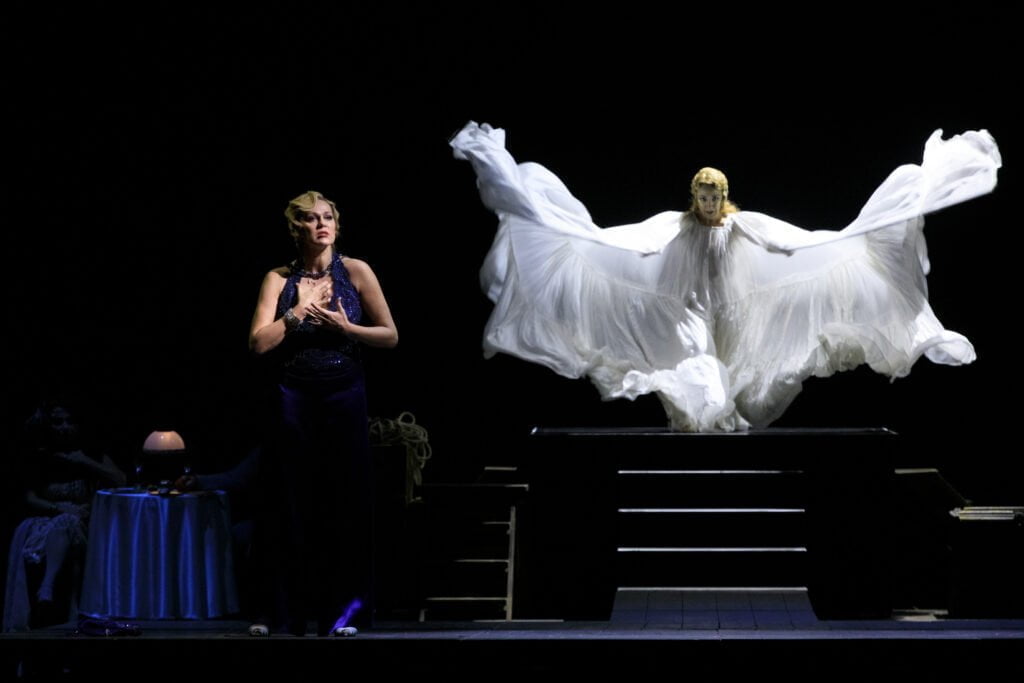
This preamble (perhaps too long, and we apologize to our readers) seemed necessary to introduce the Adriana we just witnessed, because the director, Rosetta Cucchi, had the idea (by no means new or original) of staging the four acts in different times… indeed, in three different centuries.
We have already reported on this show – born as a film-opera when the closure of the theaters prevented any live performances from taking place – when it was broadcast by Italian Television (RAI) last March. As a film, it could perhaps have its own raison d’être, even if it had, in our opinion, the unforgivable handicap of excluding the protagonist, Maurizio di Sassonia, from the Fourth Act, transforming him into a vision, a hallucination of a dying Adriana. It was a big handicap, since it seriously penalized the role of the tenor, whose off-stage voice was heard haloed and far away. It would have been normal (in our opinion at least) to expect this “movie trick” to be eliminated once the show was brought to the stage. But this only happened to a minimal degree. Indeed, in the last act, Maurizio is not there. Or, at least, you can’t see him. Luckily, you can hear him, all the more so because he sings with the beautiful voice of tenor Luciano Ganci, but the scene is totally distorted, and at times completely puzzling. But, apparently, the audience, on the whole, was not aware of the protagonist’s “absence.” We suspect they found it not only acceptable but absolutely normal… as the opera had been written just like that.
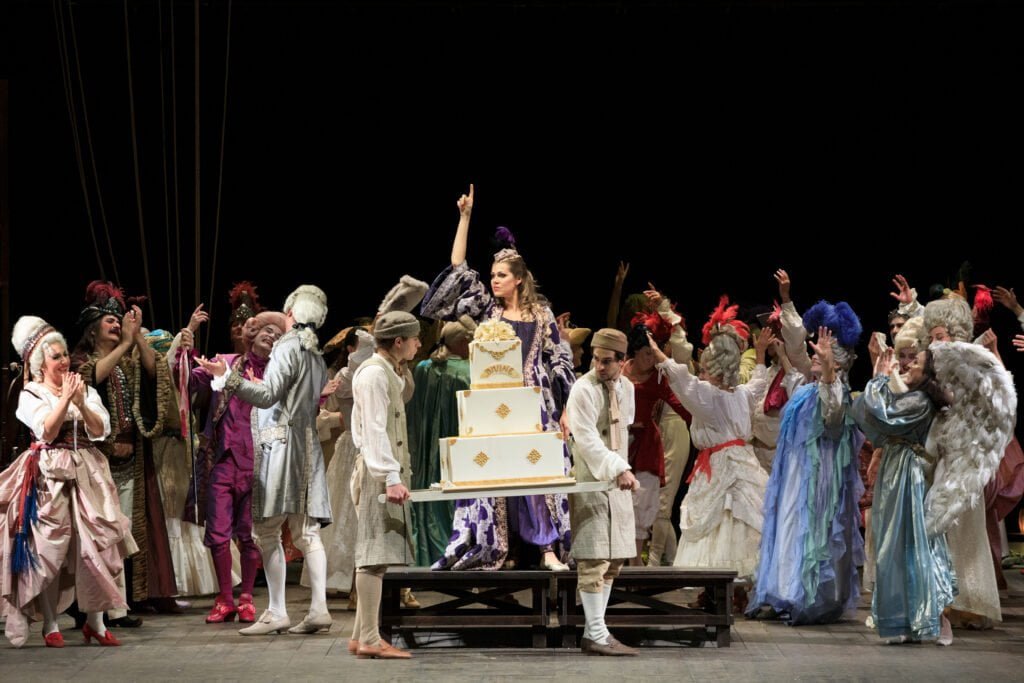
Highly annoying
In the First Act (actually enjoyable and with some original features, such as the use of two side boxes of the theater overlooking the stage), and to a certain extent also in the Second Act, one can more or less follow the story, but then, as a viewer, one loses the plot, so to speak. The Second and Third Act should take place in the same night, in close temporal succession. Changing the setting, and even the century, creates confusion, which is highly annoying for those who know the opera and difficult to grasp for those who do not.
The Fourth Act, then, is a total invention by the director. All that remains of Cilea’s opera is the music. The text also undergoes small but vital tweaks.
Once Adriana’s maid has been deleted (to spare an extra? We did not think the budget was that tight…), a “Tell her” by Michonnet is also deleted, since he has no interlocutor to turn to. But if this might seem like a minor detail, it does have a consequence that distorts all subsequent developments. Michonnet writes a note to Maurizio, but (on second thought? So it seems…) he does not send it.
“Sei servito”
And so, having kicked Maurizio off-stage (an absolute first in the history of opera, as far as we know, and another dangerous precedent), the director develops the scene only with the projection of some (beautiful, it’s fair to say, to recognize the author’s and the singers’ merit) filmed scenes of the love encounter imagined by Adriana. And so Cilea, Colautti and the audience can sadly comment, as Michonnet “Sei servito” (You are done).
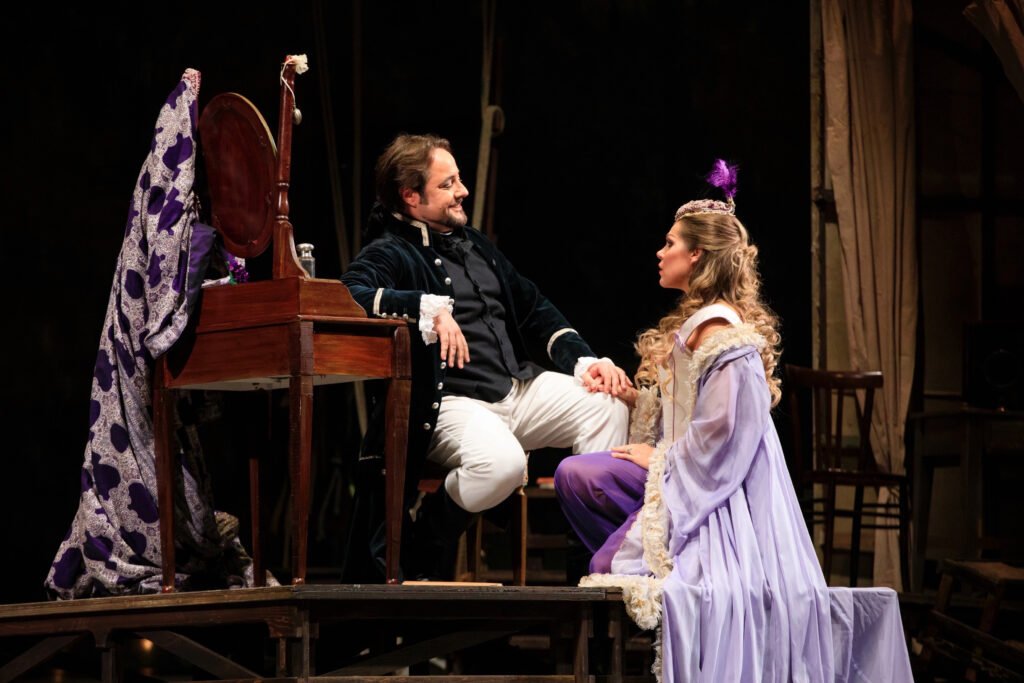
As for the music, the cast is the same as in the film-opera, except for the absence of Nicola Alaimo as Michonnet, replaced by Sergio Vitale. The in-house performance, as it’s easy to imagine, gives the chance to appreciate the voices in a way not allowed by the double mediation of the recording and the TV broadcast. In the title role, Kristine Opolais shows a voice of ample volume, even if the sound is sometimes slightly harsh and her phrasing is not particularly rich in colors. However, the soprano is a very effective actress, and perfectly manages to evoke emotions, especially in the last Act. Veronica Simeoni brings all of her limitations, which we have already stressed several times, to the role of the Principessa – a voice which is too clear for a mezzo, and consequently a rather feeble low register. But the character is drawn effectively: a proud and treacherous princess, sarcastic and even ferocious. As Michonnet, we missed Nicola Alaimo. Vitale, although he has a good voice and great commitment, was not entirely able to convey the same vein of resigned melancholy that had moved us in the film. Last, but certainly not least, Luciano Ganci’s Maurizio was, in our opinion, the highlight of the evening. The tenor – just back from an unexpected and very successful debut, in the same role, at the Vienna Staatsoper, where he had been called, literally overnight, to substitute for the scheduled colleague – confirmed all the characteristics that distinguish him: musicality, beauty, and softness of the timbre, blazing high notes and an accurate and effective phrasing.
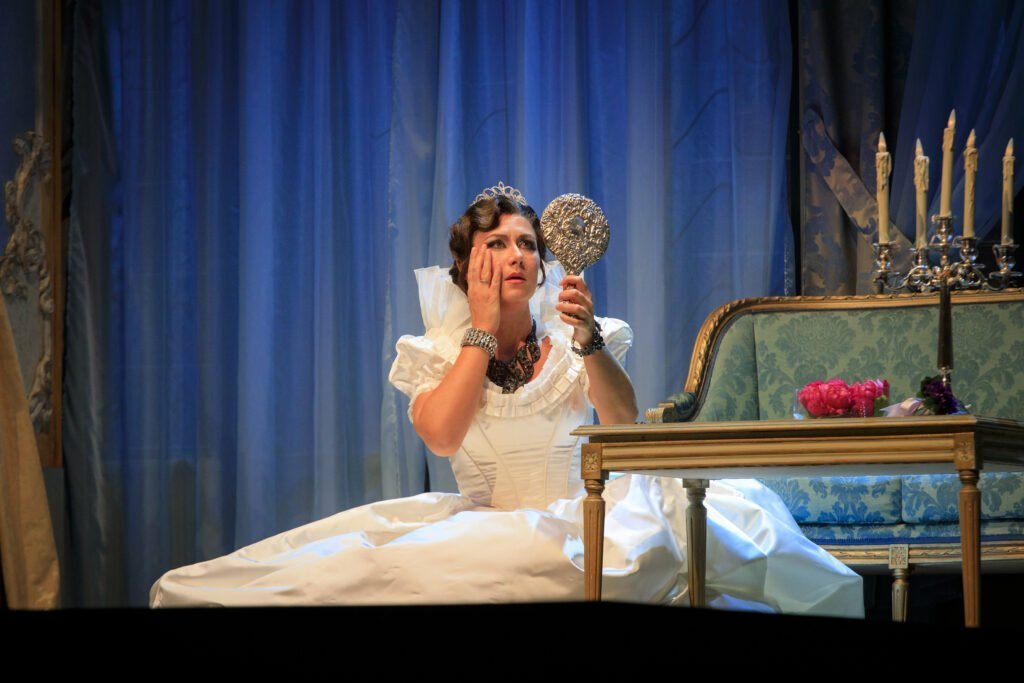
The numerous accompanying characters were all up to the task, with a special mention for Gianluca Sorrentino, witty and fun in the role of the Abate. Asher Fisch conducted the excellent orchestra of the Comunale di Bologna in a safe performance, without any particular surplus of imagination, but also without any weaknesses, save a tendency to press on the accelerator of the “forte”, sometimes threatening to create difficulties for the singers, even though they are all endowed with voices that certainly have no problem “passing” the orchestra.
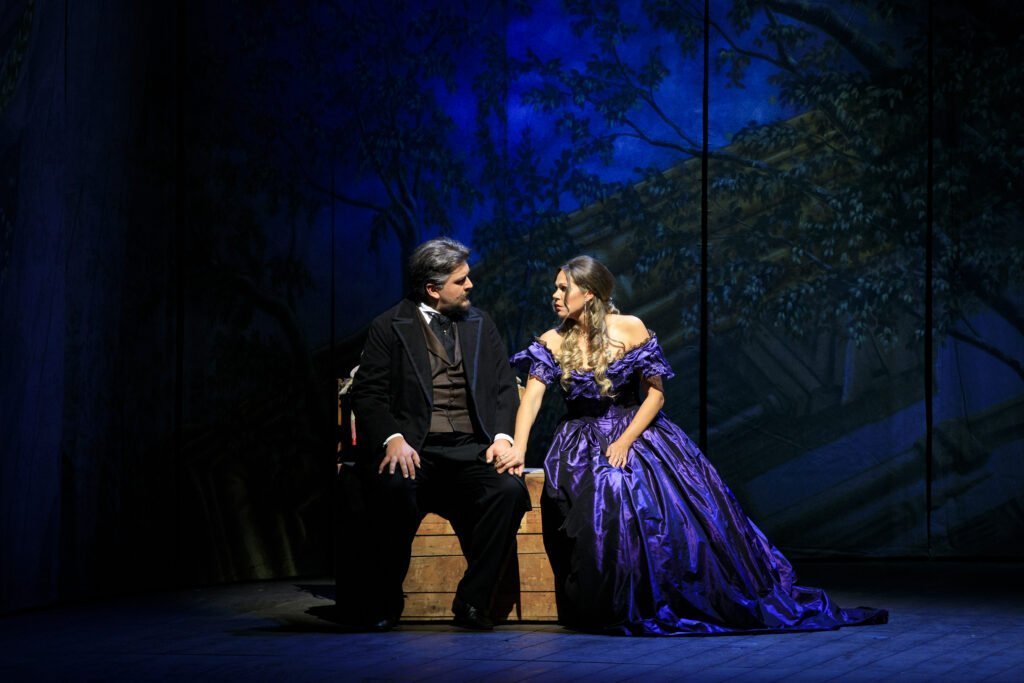
Infidelities
Lastly, we will not comment on the performance of the excellent acrobat, Davide Riminucci, since it is totally incomprehensible to us why his number replaced, by choice of the director, of course, the “Judgement of Paris” (enriched by a golden apple so huge that it took two attendants to get it of the stage). This was but one of the many minor and major and sometimes inane “infidelities” to the text. But, sadly, “the audience applaud, laughing cheerfully” to quote a famous phrase from Pagliacci.
And opera languishes.
Marina Boagno

I truly cannot understand that one changes the words of the libretto. I accept that directors do not care about the work, but only about their vision. But where is the intendant, with a heart for opera and tradition?
Opera died a long time ago, I’m afraid. What can we do?
Certainly, changing Maurizio’s last scene to a hallucination is alarming. But alas, it is part of a trend that’s already been launched; it is not the first time. The first time is in a very recent Tristan und Isolde, in which everything in the third act from the Shepherd’s signal that Isolde’s ship’s been cited through the end of Isolde’s “Mild und leise” is presented as Tristan’s dying hallucination. Right after Isolde’s fading note on “Lust”, she, Brangaene, the steersman, Melot’s corpse, Koenig Marke, etc., all disappear from the stage, and there is Tristan’s corpse, with only Kurvenal and the… Read more »